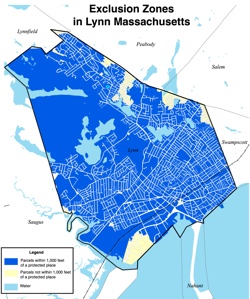Prison Policy Initiative helps overturn a harmful banishment ordinance in Massachusetts
Massachusetts top court says a city can't bar people on the sex offender registry from living in the city.
by Peter Wagner, September 2, 2015
On Friday, Massachusetts’ highest court unanimously struck down a city ordinance that made virtually the entire city off-limits to people on the state’s sex offender registry.
In 2012, the ACLU of Massachusetts and the Committee for Public Counsel Services sued to challenge the restrictions, in a case now known as Doe v. City of Lynn. The Court found these restrictions unlawful, unsafe and ineffective. Their ruling will have the effect of invalidating about 40 similar ordinances in communities across the state.
“The Supreme Judicial Court has unanimously recognized that local ordinances seeking to banish sex offenders are incompatible with state law and, in all likelihood, make the public less safe,” says Jessie Rossman, a staff attorney with the ACLU of Massachusetts. “The Court also wrote that ‘the days are long since past’–citing the internment of Americans of Japanese descent and the forced migration of Native Americans–when entire groups of people ‘may be lawfully banished from our midst.'”
 In its ruling, the court cited my maps and expert report showing that the city’s ordinance rendered at least 95% of the residential properties in the city off limits to people on the registry. My map of the city’s exclusion zones demonstrated that by making all areas within 1,000 feet or schools, parks and day care centers off-limits to people on the registry, the ordinance made virtually the entire city off-limits.
In its ruling, the court cited my maps and expert report showing that the city’s ordinance rendered at least 95% of the residential properties in the city off limits to people on the registry. My map of the city’s exclusion zones demonstrated that by making all areas within 1,000 feet or schools, parks and day care centers off-limits to people on the registry, the ordinance made virtually the entire city off-limits.
Like the 2013 decision of a Federal Judge in a Colorado case that I testified in, the Massachusetts court found that the city’s ordinance undermined effective state regulation. As the ACLU explained:
The Court recognized, too, that when lawmakers created the state sex offender registry, the Legislature chose a path meant to protect the public. Ordinances like Lynn’s stand in the way of that intent. “Local residency restrictions undermine the state system by forcing sex offenders into homelessness, which makes them harder to find and destabilizes rehabilitation,” Rossman says.
Ordinances like this also fail to create safe communities. “Our image of the sex offender lurking on the edges of our school playground and parks is simply not true,” explains Dr. Laura Guidry, president of the Massachusetts Association for the Treatment of Sexual Abusers. Dr. Guidry cites figures from the Justice Department, which show that 93 percent of children who are sexually abused are harmed by family members, close friends or acquaintances. This means that residence restrictions will do nothing to stop the most common situations in which children are sexually abused. “What does work are restrictions based upon a careful risk assessment that looks at the risks posed by each individual adult or adolescent in question,” Guidry says.
The Massachusetts ruling comes as part of a growing national trend, in which high courts and officials in states such as New York (link no longer available) and California have rejected similar restrictions.



